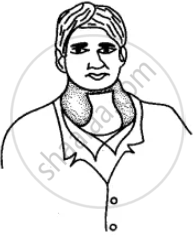Advertisements
Advertisements
प्रश्न
Name the hormone responsible for the following function:
Ossification of bones
उत्तर
Calcitonin
APPEARS IN
संबंधित प्रश्न
_______ maintains basic metabolic rate.
(A) Thyroxine
(B) ADH
(C) GH
(D) Oxytocin
Define the following:
Endocrine glands
Complete the table given below by filling in the blanks numbered 1 to 8.
| Gland | Hormone Secreted | Effect on Body |
| 1 | 2 | Regulates basal metabolism |
| Pancreas (β-cells) | 3 | 4 |
| 5 | 6 | Increases heart beat |
| 7 | Thyroid stimulating hormone | 8 |
Given alongside are the diagrammatic sketches of some endocrine glands. Observe the figures and answer the following questions:

(i) Label the parts numbered 1 to 5.
(ii) Name the hormones secreted by (2) and (5).
(iii) Which chemicals in our body are greatly affected by hormones?
(iv) What is the chemical nature of hormones?
(v) Name the elements related to the functioning of hormones secreted by the structure (2) and (5).
The sketch below shows a certain condition in an individual:

(i) Name the condition.
(ii) What is the underlying cause of this condition?
(iii) Name two other conditions that could have resulted due to a similar cause.
(iv) Which hormone is required for iodine synthesis?
(v) Where is the thyroid gland located?
(vi) The hormone secreted by the thyroid gland is controlled from which hormone?
Column ‘II’ is a list of items related to ideas in Column ‘I’. Match the term in Column ‘II’ with a suitable idea given in Column ‘I’.
| Column A | Column B |
| (i) Pituitary | (a) produces male sex characteristics |
| (ii) Ovaries | (b) decreases blood sugar level |
| (iii) Thyroid | (c) increases heart and breathing rate raises blood pressure |
| (iv) Thymus | (d) produces female sex characteristics |
| (v) Adrenals | (e) is known as emergency hormone |
| (vi) Hypothalamus | (f) regulates the level of calcium and phosphorus |
| (vii) Pancreas | (g) increases the rate of metabolism |
| (viii) Testes | (h) maintains the level of calcium |
| (ix) Parathyroid | regulates the amount of water excreted in the urine. |
| (x) Cretinism | (j) simulates skeletal growth |
| (xi) Diabetes mellitus | (k) regulates the activities of other glands |
| (xii) Insulin shock | (l) stimulates the development of male and female sex organs |
| (xiii) Gigantism | (m) Shortage of glucose in the blood. |
| (xiv) Enlargement of breasts in adult males | (n) Over-secretion of growth hormone |
| (xv) Exophthalmic goiter | (o) Excess of glucose in the blood |
| (xvi) Acromegaly | (p) Over-secretion of thyroxin |
| (xvii) Addison’s disease | (q) Dwarfism and mental retardation |
| (xviii)Cretinism | (r) Over-secretion of cortical hormones |
| (xix) Dwarfism | (s) Under-secretion of the adrenal cortex |
| (xx) Adrenalin | (t) Under-secretion of thyroxin in children |
| (xxi) Vasopressin | (u) Over-secretion of growth hormones in adults |
Which statement is not for a hormone?
Comment on homeostasis.
Predict the effects of removal of pancreas from the human body.
Distinguish between Diabetes mellitus and Diabetes insipidus (endocrine gland concerned).
